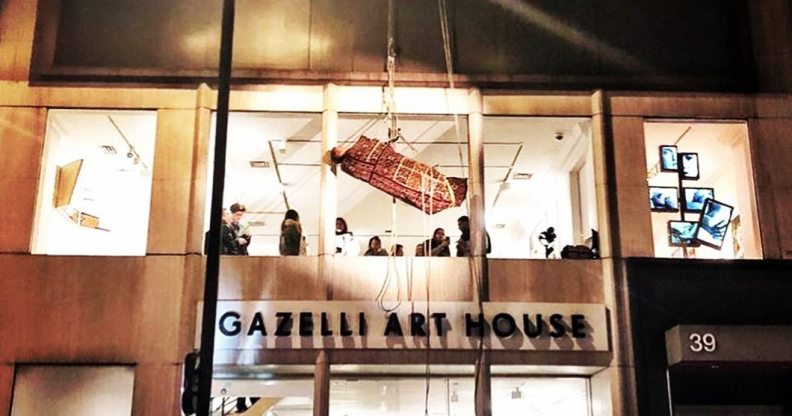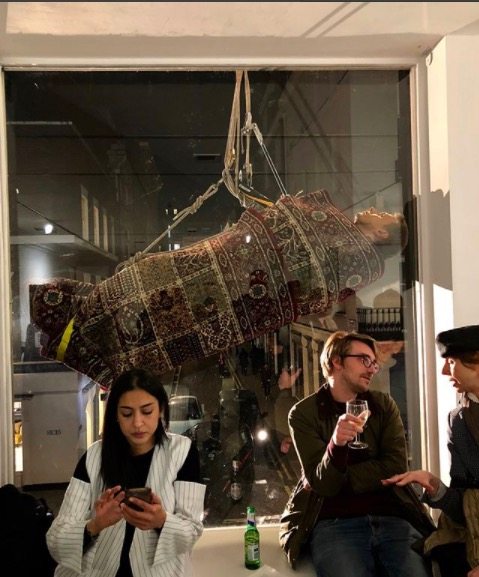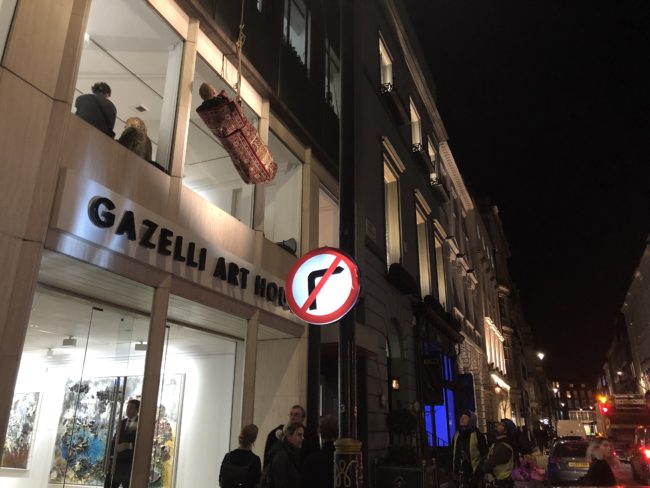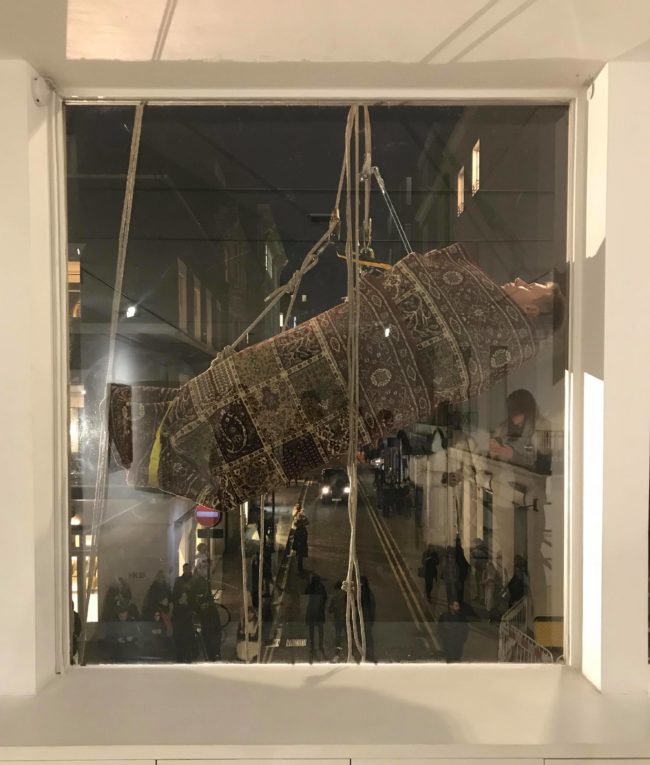This artist suspends themselves from buildings to draw attention to human rights violations

(Photo by fyodorpavlovandreevich/Instagram)
PinkNews Exclusive
Fyodor Pavlov-Andreevich is the definition of a multi-hyphenate. The former TV presenter, magazine publisher and producer would now describe themselves as a “Brazilian visual artist, British curator and Russian theatre director”, and they are making waves in the art world.
The creative arrived at performative art after running a show in which they would hire actors and they would have to perform a text that they were not familiar with.
Titled The Hygiene, Pavlov-Andreevich was told by a German curator that this was not theatrical as they previously thought, but rather performance art.
“I felt like I was a transgender being all my life without knowing it – and that moment was my transition to the right body in my natural state,” they explained.
That moment was 10 years ago, and since then the artist has hosted a whole slew of shows which included them laying naked on the floor of the Paradise Row Gallery in East London.

(Photo by Lyuba Galkina/Provided by Fyodor Pavlov-Andreevich)
Related: This ‘blood bath’ by Lush shows just how many lives gay donors could save
They have since realised that performance was always at their core.
“I somehow always knew I was a performance artist. All my childhood I’ve been doing some weird solo things which I now can identify as acts of live art,” they said.
Pavlov-Andreevich is a gay person who believes in gender fluidity. While their work aims to raise awareness of human rights violations, they acknowledge their identity intimately within their work.
They explained: “I’m openly gay but I seriously believe that your private life and your work have very little to do with one another.

(Photo by Oxana Smirnova/Provided by Fyodor Pavlov-Andreevich)
“I often talk about sexuality, over and underexposure, a relationship between a work of art in performance (which is often the artist’s own body) and the museum visitor/spectator – but once it comes to a matter of sexuality, it is important to know ‘who exactly has the desire – the character or the author’.
“It works the same way in visual arts – your own desire may easily outshine the sense of your work. So what is important here is the balance,” they added.
The artist believes that art “is a powerful tool” especially when looking at it in turn with society, but they insist that there is only so much you can do to argue for LGBTQ equality within art, because “you won’t convince the radically equipped others until the moment they see a work of art that makes them shudder”.
“It takes a second – comparing to the long hours of conversation, historical details and human experience.
Related: This trans non-binary artist is making art with their menstrual blood
“Art knows very well how to make you cry, how to cover your skin with goosebumps, how to even make you feel a terrifically strong sexual desire in a situation that has nothing to do with any sort of eroticism or attraction. That’s the type of art I very much believe in.”
In their most recent performance, Pavlov-Andreevich wrapped themselves in a traditional carpet which is used to wrap corpses in Chechnya.
They then suspended themselves outside of the Gazelli art gallery in Dover Street for five hours.
They welcomed shocked comments from observers and passers-by, especially as the performance went on late into the evening and intoxicated people began to mill about.
Pavlov-Andreevich highlighted the struggle of Chechens in this piece by leaving their head without any support for the full performance, meaning that by the end they were nearly “howling” in pain.
“The torture was for good – it made it more sincere this way, talking of pain and death through the actual pain,” they said.
They added that the piece “was an attempt to dilute the posh environment of Dover Street with a bit of an absurdist surprise”.
The money that the artist earned from selling the prints was then donated to the Russian LGBT Network, although they did not manage to raise that much during the performance.
“We didn’t manage to raise significant funds, even though some several hundred visitors stopped by. It’s easy to explain, people aren’t used to buying art in parallel with a live performance,” they said.
Barack Obama picks gay artist Kehinde Wiley to do his official portrait
For Pavlov-Andreevich, the current state of LGBTQ issues in Chechnya is important because their roots are intrinsically linked to the region.
Their maternal great-grandfather, Nikolay Yakovlev, was a “well known Russian linguist who created an alphabet for the contemporary Chechen language in the 1920-30s”.
“The nation survived through the toughest times in the mid 20th century,” they said. “Chechens, along with Jewish people, were Stalin’s most beloved target.”
“I feel terrible about the tragic situation happening in the country in the past decades – first devastating wars, and now the political regime very close to Nazis.”

(Photo by Yulia Filipovscaia/Provided by Fyodor Pavlov-Andreevich)
The artist went on to explain that they feel that they need to work to support all of the marginalised groups in the region.
“Gay people aren’t the only ones that suffer. The secret prisons have been previously organized for the supposed drug users, for the Muslim people of the alternative confessions, for the women considered witches and for those Chechens who dare to criticize (even a tiny little bit) the actual political power.
“It is sad that Western society doesn’t stand against a terrible position of a woman in most of the Muslim states across the world – or it doesn’t want to interfere and defend those Chechen human rights activists or people that have been adjudged drug addicts – as they suffer as much as gay people in Chechnya.
“But an idea of a gay individual tortured and killed for the sake of their sexuality, is impressive – and this way there is a chance that through the wave of international influence the Chechen leaders would reduce the terror and wrap up their witch-hunting ambitions,” they said.
Pavlov-Andreevich is “far away from being a political activist or even a politically oriented artist” but they hope to continue raising money for the Russian LGBT Network. If you want to donate and help the Chechnya situation you can do so here.
Fyodor Pavlov-Andreevich at MET GALA 2017 / video by Lavoisier Clemente from fyodor pavlov-andreevich on Vimeo.

